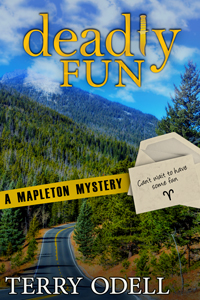Stay in the Phone Booth With the Gorilla
Terry Odell
 One of my critique partners is a computer programmer by trade, and one of the things we frequently mention in our critiques is how much detail is needed, and when. His mind works in a very logical fashion, and he’s always looking at every what if possibility. Normally, I’m pointing out where he doesn’t need to cover all the possible permutations of any given situation. But once in a while, he’ll catch me dwelling on unnecessary details. I figure when he sees them, I probably need to cut.
One of my critique partners is a computer programmer by trade, and one of the things we frequently mention in our critiques is how much detail is needed, and when. His mind works in a very logical fashion, and he’s always looking at every what if possibility. Normally, I’m pointing out where he doesn’t need to cover all the possible permutations of any given situation. But once in a while, he’ll catch me dwelling on unnecessary details. I figure when he sees them, I probably need to cut.
When I’m writing my police scenes, I do like my character to weigh all the options, since they’re trying to piece together clues, and often they don’t know what’s a clue and what’s not. But in an action scene, it’s important to remember to stick with the action. This isn’t the time to have your characters stop to reflect on the past. Dripping in back story should be done judiciously, and it’s probably never appropriate in life-threatening situations. Or even tension-filled scenes. Here’s an example from when I was working on Dangerous Connections:
My heroine, an undercover Vice cop, was supposed to use her “feminine wiles” to distract another character so the hero could mess with a computer program. I had her thinking about her job, because I wanted to make it clear that because she worked Vice didn’t mean she was experienced at seducing men.
Elle shoved her mind to the place she sent it when she was working a major sting. Truth of the matter, her day-to-day routine working vice didn’t involve seduction. Seduction could lead to claims of entrapment, and that was a headache for everyone. The johns weren’t fussy, and they didn’t want romance. All she had to do was get the money to change hands, and someone from her unit would show up and take them both away so as not to break her cover.
My partner’s comment: “I think you need to stay in the phone booth with the gorilla.”
Here’s an explanation from Robert Newton Peck’s Secrets of Successful Fiction:
Alma walked hurriedly down the dark and deserted street. Hearing footsteps echo behind her, she darted into a telephone booth. Before closing the door, Alma Glook knew she was not alone. With her in that phone booth was a five-hundred pound gorilla.
“Help!” yelped Alma.
Seeing the gorilla, her thoughts turned back in time to when she was a little girl, back home in Topeka, living with her aunt Mildred who was a taxidermist and scratched out their meager living by stuffing gorillas. In fact, her aunt had earned quite a reputation in college when she had, as a prank, stuffed nine gorillas into a phone booth.
Your readers aren’t interested in Alma’s past right now. They want to know how she’s going to deal with the gorilla. And the readers probably don’t need to know the ins and outs of working Vice. They want to know if Elle is going to be able to distract Bill so Jinx can do what he’s supposed to do.
A character’s thoughts can reveal a lot. Just be careful where you insert them.
 My new release, Deadly Fun. I’m sharing all March royalties with the National Multiple Sclerosis Society.
My new release, Deadly Fun. I’m sharing all March royalties with the National Multiple Sclerosis Society.

Terry Odell is an award-winning author of Mystery and Romantic Suspense, although she prefers to think of them all as “Mysteries with Relationships.” Follow her on Facebook and Twitter.


Great example of when not to include backstory!
Thanks — falls into the ‘time and place for everything” category.
Did Alma have any bananas?
Good insights, Terry. Love the gorilla in the phone booth. Great that you found that example. Yours is pretty good, too. Reflection and flashbacks are important elements. But where we put them is equally important.
I need to rethink mine. MC Mike has two flashbacks. Both occur when he’s lying awake and can’t sleep. That’s good. No gorillas or phone booths. But, especially for the first flashback, I need to ask myself, Is that what Mike would be thinking about at that point in the chain of events?
Guess Alma will start keeping bananas in her purse from now on, Eric.
And, as I mentioned to Karla, finding the right time and place for back story has to be dictated by the character. What triggered your MC’s flashbacks? Have you set up that he’s plagued by nightmares, afraid to go to sleep? Bothered by noise? A certain song on the radio? (Do people even HAVE radios anymore?)
I’m re-reading Crais’s “Suspect” now for book club, and all of Scott’s flashbacks have triggers, and Crais feeds in a little at a time.
Good post. Thank you.
I like your use of the phrase “dripping in backstory”. It conjured up the vision of a painter holding his brush over the canvas and letting the paint drip to create interesting layers of color-not too much-just a hint.
In the learning curve of noveling as I am, backstory is one of those crafts I’m constantly trying to “get good at”. The MC in my current project has tons of backstory that I’m dotting the landscape with-trying to give the reader a small piece at a time without intruding into her present frightening circumstances too much.
I’m getting that it’s a balancing act. 🙂
And my “vision” of backstory comes from a workshop where the instructor said, “Think of backstory as an IV drip, not tube feeding.” Your image is far prettier.
Two questions I ask as I’m writing: “Does the reader need to know this?” and “Does the reader need to know this NOW?”
JSB has some good suggestions for working in backstory.
And with my background of 30+ years in healthcare, I totally get the IV drip thang…! 🙂
Great reminder, Terry. Esp. when it comes to openings. Many new writers think the reader has to know everything about the whys and wherefores early on. Nix! Act first, explain later. Readers will wait a LONG time for exposition so long as the gorilla is there.
Opening chapters, especially for new writers, are more for the author than the reader. Some might call it … plotting. Or … outlining. Get it down, get comfortable with the characters, but then start your book much further on. Drip those bits from your discovery chapters in as needed.
Of all the sentences in all the world, your title is one I never expected. That woke me up more than my first sip of coffee. Being a nerd, my first thought was Gorilla Grodd uses phone booths? The second involved the Doctor and the TARDIS. A nerd, through and through. Anyway, I totally agree with the minimal backstory during true action scenes, but a few words can work in a slower action scene. Something along the lines of “She straightened, throwing he shoulders back to lift the boobs, then did her patented I’m-a-sexy-hooker Vice sting strut toward the office worker.” That’s a bit funny, too, if you want that. If this were an actiony action scene like fist fight, a line like this would be totally off point, though.
I like your suggestion, Marilynn!
Something similar was shown from the hero’s POV right before the shift to her thoughts, so readers have seen her “action” which is why my critique partner was right about not needing to show so many of her thoughts when she was trying to work her distraction. the readers knew she was ‘faking’ it.
For the record, this is what readers saw from the hero’s POV:
Elle’s eyes went all bedroom. Her lips curved. Her scent wafted through the air as she tilted her head, shaking out her hair. She tucked a curl behind her ear and stepped closer to Bill. “I’d love to know more about living here. We might end up being neighbors.” Her voice was like maple syrup dripping over a stack of pancakes, smooth and slow.
“Stay in the phone booth with the gorilla.” I don’t think I’ll ever forget that advice!
Glad you found it memorable, Priscilla.
Timely post. I’m working on a 2k word short story contest entry that I have to submit near the end of this month. I’m trying to balance that fine line between keeping the tension up during high stakes yet feeding in what is necessary as backstory. A little backstory is necessary but with only 2000 measily words, you can’t mess around. I only just completed the first draft yesterday (with almost 4k words. UGH!) so it’s too soon to see if, in the end, my story concept will fly as a short fiction entry.
But who cares? I’m having fun!
“But who cares? I’m having fun! ”
That sums it up for me. Do what you enjoy, and then deal with the nitty-gritty stuff later.
Though Alma’s ability to dip into nostalgia at such a time raises a great many questions …
I’ve been reveling in points of view where I can give my backstory where it fits, rather than being forced to give it when the character is reminded of it. I love having a narrative voice that’s not tied to the current moment, especially first-person yarns or third-person limited omniscient, where the narrator is deliberately telling the story and can conscientiously give whatever information the audience needs to follow it.
Sounds to me like you lean more into the “literary.” I’m a Deep POV kind of person, and am pulled out of any story where it’s a narrator telling the story instead of the characters.
Not to say either is ‘wrong’ or ‘right’, ‘better’ or ‘worse.’
Thanks for sharing your thoughts.
I’ve often wondered about that. As far as I can tell, Deep POV is constructed as if no one is telling the story at all: it appears out of nowhere as a disciplined form of stream-of-consciousness. Or am I wrong about that?
And once we’ve strangled the narrator, who’s providing backstory and exposition? For example, how does the reader learn things that the character knows perfectly well but doesn’t actively ponder during any of the scenes? (And if they do ponder them, how does the author prevent them from seeming dissociated from events?)
Deep POV is very much the same as 1st person. And it’s the author’s job to provide that information. Nobody said this gig was easy. 🙂
But a lot of mystery authors–using Michael Connelly as an example–write in a more distant POV and they can filter in the back story so well that the reader never doubts that the character is thinking those thoughts.
Remember when you are being chased through the woods by gun shooting thugs you don’t have time to stop and smell the roses.
And, if you’re writing romance, this isn’t where to stop for sex, either.
Sorry I’m late. Great post, Terry. Welcome to the family!
Thanks, Sue.